Theatre Reviews
ALAN BENNETT'S BED AMONG THE LENTILS - Library Theatre Touring Co.

Anything from Alan Bennett’s Talking Heads series is safe ground. Nothing original or groundbreaking but solid theatre and always enjoyable. Deborah Kelly does a fine job of interpreting Bennett's script; giving a nuanced performance completely in tune with the material.
Talking Heads has been around a long time now and we all think we are familiar with them but this performance of Bed Among the Lentils reminded us of how witty and incisive the plays are.
The protagonist, Susan a vicar’s wife, laments about having to attend every service her husband conducts – a barrister’s wife doesn’t have to attend every trial or an actor’s wife every performance. She also mentions that her husband has never discussed whether or not he believes in God. However, she acknowledges she is “cut out for God” being simple, unglamorous, and able to run a ‘tight garden fete’.
We learn about how flower arranging has become competitive- to the extent where a conker is pivotal to a display ("this is an altar not Wind in the Willows"), and Bennett slips in low key references about her husband being away in Keighley 'blessing a steam engine'. Another comic moment occurs when the Vicar finds himself out of communion wine (Susan has been drinking it) and gives communion with Benylin cough syrup.
The plot moves on to an understated affair with a Hindu shopkeeper in Leeds who helps Susan off her growing alcohol habit, and concludes with his departure for India.
The play is a reminder of how Bennett takes familiar mundane everyday details and develops them effortlessly into reflections of life.
A lovely comfortable evening.
I learned that the Library Theatre company of Leeds was founded and run by Roger Cook, who sadly died in 2019. His wife Deborah dedicates this show to his memory. He would have been proud.
Further performances 9th July 2:30. and 7:30.
Brian Kirman
ANIMAL FARM - Sprinkle Theatre Company
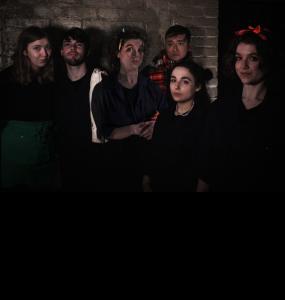
Sprinkle Theatre Company are a relatively new venture aiming to make classic texts more approachable. Their ‘one goal is very simple, to try and help school children become excited by stories that might not be receiving the appreciation they deserve.’
So, to their production of Animal Farm. The cast of six played all the protagonists in this tale that still strikes a chord with today’s audiences. They aimed to blend physical theatre, puppetry and music to bring the story to life. On the whole this worked, but I would like to have seen a more fluid transition between the moments of physicality and character acting to properly work.
I have to admit to only having a light touch memory of Animal Farm and I think this meant I had to really concentrate on trying to remember names and who was which animal. Once I relaxed into pigs bad other animals not so bad, then things became easier. I liked the blend of live music and slickly operated sound effects overseen by musical director Peter Lynn. The costume was strikingly simple, with symbolic additions to denote character, this added clarity as to who was playing who.
Direction, by Elizabeth Hann and Movement Direction by Georgina Taylor ensured that the animals all had clearly defined physical attributes which was especially important in the portrayal of the pigs. The relationships between the animals and their growing realisation of what was happening was sensitively played.
Post Covid it was good to see the actors coming into the audience in an attempt to make them feel part of the collective meetings.
Georgina Taylor was excellent as Mollie then as the old goat Muriel. Her physical and vocal skills perfectly embodied the animals she was playing. This made her really watchable. Jacob Bee played a thoughtful Benjamin as a stark contrast to the leather-glove-clad Napoleon. All the actors who played Napoleon did so with an equal level of threat and menace by their use of physicality and tone of voice. Squealer was as at their most oily, subservient pinnacle when played by Déborah Dubosq.
I think the start needed more volume, especially from the actor playing Clover, but once things settled sound levels were much clearer, but perhaps this was first night nerves in a new venue.
It was interesting to add a new character, although until I read out the cast list, I didn’t realise that this character was ‘Fly’ performed with intense focus by Emma Laverty. The concept of this figure always watching is obviously great in an Orwellian tale.
Overall, a very watchable show performed with commitment and skill. Catch it if you can!
Jayne Marling
ANY OTHER DAY - Empress Presents

There’s a meme going around on social media at the moment containing facts about Alan Turing. It talks about how he committed suicide by eating a poisoned apple, and how this inspired the Apple logo. Steve Jobs always refuted this link, and the facts of Turing’s death remain similarly obscure. Many (not least Turing’s mother) have claimed that Turing was notoriously careless and that it was entirely possible that, while conducting experiments with cyanide at home, he could have accidentally ingested it on eating an apple.
We’ll never know what really happened, but in Margaret Holbrook’s new play Any Other Day, she seems to be taking the accident view. The play is set three days after Turing’s death – his neighbours, Ann (Heather Elise Nelson) and Mrs B (Lucy Savin) meet at his house to remember him, watched over by Turing’s ghost. We also flash back to a meeting between Turing and his wartime fiancée Joan Clark.
Jonathan Whittington plays Turing with a quiet detachment – the script talks about his eccentricities and restless energy, but his character is drawn with a stillness that seems to contradict that. In the scene with Joan, Lucy Savin brings an affectionate sadness to their relationship and their shared nostalgia for the certainty of their wartime work at Bletchley Park.
Ultimately, Any Other Day is less a play about Turing and his genius than it is about fate and making every day count. It also shows us the difference between the legend of a man, and the personal, perhaps less showy memories of those who knew and loved him.
Robbie Carnegie
THE BALLAD OF MULAN - Red Dragonfly and Grist to the Mill Productions

The legend of Mulan dates from a 6th century Chinese Poem, somewhat predating the Disney version that you may be familiar with. Playwright Ross Ericson has gone back to the source to present a battle-hardened Mulan, reflecting on her years at war disguised as a man, and her fears for the future as she faces one last fight.
The play interleaves scenes from Mulan’s first battle with the now General Mulan reflecting on her life hidden in a man’s world fearing discovery at any point. Those battle scenes are viscerally portrayed by Michelle Yim in impressive armour wielding a fearsome halberd, augmented by an excellent soundtrack evoking the sounds of war. Equally convincing is the older war-weary Mulan, reflecting on how and why she ran away from home to become a soldier, her experiences as a young recruit, and how old colleagues are gradually lost to war and her rise through the ranks.
At heart, the play’s subject matter is identity which seems particularly resonant at these times. How can Mulan be who she wants to be against societal expectations? In a conservative family based culture, can she return to live as a woman in the future after achieving such fame as a man? After all this time playing this role, is this who she really is?
Michelle Yim is superb as Mulan, setting the pulse racing in the heat of battle, but entirely believable in her evocation of the world of men as they tell stories around the campfire, and talk of experiences she can’t share, and may be forever denied. Enjoy a thoroughly engaging and enjoyable hour in the company of Mulan.
Stephen Walker
BEAST IN THE JUNGLE - Despite the Monkey
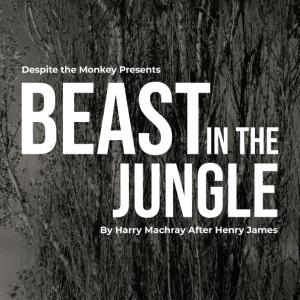
Henry James published ‘The Beast in the Jungle’ in 1903, five years after ‘The Turn of the Screw’, and it is one of his best short tales. Here, Harry Machray has taken the novella and turned it into something for – and of – today.
One key selling point of ‘Despite the Monkey’ is that in its performance work it aims to add today’s technology to drama performance in order to develop the experience for the audience.
Here, as we go into the performance space, we find a set of (lightweight) headphones wired to each seat. We are advised to put them on ‘to enhance the experience’. We hear the music and the song we’d have heard anyway over the loudspeakers, rather loud. This does force us to pay attention to the words of the song in a way we might not have done otherwise, and then as the piece develops we realise that all the spoken word too, as well as background sound effects, come to us through the headphones.
There’s a vertical grid of (bright, much brighter-than-fairy) lights behind the performers, bright enough to worry us: sometimes these are static, sometimes they move to reflect the volume of John Marcher’s (Dean Michael Gregory) voice and emotional stress. There are other tricks with lights too.
As to the tale itself, Machray has retained the core themes of the novella (loneliness, fear of the future, loneliness, love, timidity in being able to deal with reality) and broken the narrative by jumping back and forward in time, bringing the piece up to date and yet, in a fascinating way, sometimes using the speech patterns of the past.
The piece becomes a psychological drama for today, for a time when mental stress is increasingly recognised, and while Marcher is the stressed one, Elspeth Todd (May Bartram who in a sense befriends Marcher but gets nothing back for it) is constantly ebullient whether as young child or as dying not-quite-partner.
Michael Quine
BESSIE AT MIDNIGHT, ALONE - Blue Masque Theatre
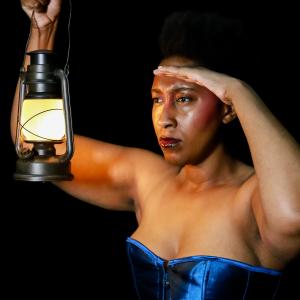
The audience are put on alert as Bessie, the long-time whore expects company. But she asks for honesty within the realms of adult themes as she is kept waiting. And waiting. And waiting!
She starts to tell stories to help pass the time and relieve her troubled mind. Well, it is midnight, and who knows who is hanging about at that hour?
With the delicate grace of a ballerina, she leaps about the stage delivering tales and characterisations. Punchy, uplifting and sobering dialogue is given life from under a smoggy layer of belted-out northern humour. But is it really helping to ease her tensions?
Midnight casts deep shadows in all directions - onto the past, the present and into an uncertain future. It is the time for the darkest thoughts and trust is under the greatest threat.
Midnight is also the perfect time to stand strong, to face up to the hardest questions and 'put the boot' into those most difficult answers. Who? Why? How soon?
David Carlisle
BIJOU @ BUXTON - Bijou Productions
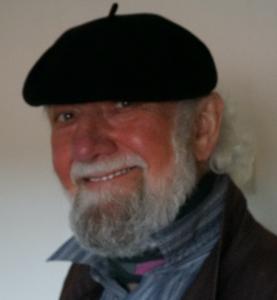
This year’s FRINGE is notable, not just for the number of different companies and productions but for the diversity of material. We have had poetry, Shakespeare (both Juke Box and Improv) expert talks from the museum, a history of rock guitar and even philosophy. Notably missing has been a book that is part of our culture and has influenced many millions: The King James Bible.
John D Slater takes this on as he assumes the role of Saint Mark in a re-telling of his Gospel.
This is a significant and familiar part of the Bible which tells the story of the many miracles attributed to Jesus.
The production got off to a shaky start as the feedback from John D Slater’s microphone made it hard to follow in the high vaulted and echoing Saint Mary’s Church. But after turning off the electronics we could hear much better. This will, no doubt be resolved for the next shows which will be quite different.
Thursday 14th ‘The Bethlehem Street Cleaner’
Friday 15th ‘King Lear, the Fool’s Tale’
Saturday 16th ‘An Actor’s Life for Me’ (Church Center Bath Rd)
Brian Kirman
THE CHRYSALIDS - REC Youth Theatre Company

Based on John Wynhdam’s novel, The Chrysalids depicts a rigidly theocratic society where those that are different, the mutants, are abused, imprisoned, or forced to retreat to the ‘Fringe’. It is a powerful metaphor for embracing change and diversity that clearly resonated with the REC Youth Theatre.
Elliot Bourne plays David, conveying with sensitivity his turning away from his zealous family after meeting mutant girl Sophie (a well modulated performance from Elyse Marling). He soon realizes that his younger brother, Peter (a quietly truthful Elijah Farrelly) also shares mutant telepathic powers, forcing them to go on the run. Indi Aucott also conveys the conflicted Anne who, despite having telepathic powers herself, would rather conform with a society that would reject her if it knew her secret.
Like many adaptations of novels, The Chrysalids presents some challenges when presented for the stage, not all of which are overcome in this production. There is much doubling-up within the cast, which would be fine, but for the fact that not enough is done to differentiate one character from the next, either in terms of costume or characterization. Likewise there is some unhelpful use of props which slows down the action while adding little to the scene.
There is much potential in this company, and the REC Youth Theatre is to be commended for continuing to inspire successive generations of ‘Fringe people’.
Robbie Carnegie
CONTRACTIONS BY MIKE BARTLETT - Hasland Theatre Company
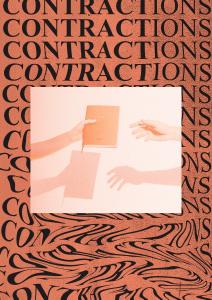
How would you react if your employer wanted to know everything about your personal life? Written in 2007, by Mike Bartlett, this play has become even more relevant as technology plays a bigger and bigger part in our lives. This two-hander takes the form of a series of conversations between ‘The Manager,’ who remains nameless, and Emma, a fairly new employee at an unspecified business. They start out in a way familiar to anybody who has had to endure a corporate ‘121’ session with a line manager. Emma’s sales are improving and she’s getting on with her colleagues. But her manager wants to draw her attention to a certain paragraph in her contract. Emma is puzzled, but initially unconcerned, until the questions get more intrusive, and the manager starts making decisions which have a major impact on her life.
The Manager, played by Nicky Beards, remains calm and collected throughout, the embodiment of reasonable unreasonableness. After all, everything is being done to ensure safety and security in the workplace. The company has a duty of care for its employees. Emma, played by Heather Cowley, is trapped and events become stranger and darker and Emma less and less able to make her own decisions.
This is a far-fetched but cautionary tale for the modern age. After the performance one audience member was overheard to say ‘If that was me I’d have got a new job!’
It was great to see Hasland Theatre Company back at the Fringe, and in the lovely venue of High Peak Bookstore. This performance was directed by Bev Dean. Unfortunately this was a one night only performance, but hopefully they’ll be back next year with another production.
Georgina Blair
FLOWERS FOR ALGERNON - Chatsworth Players
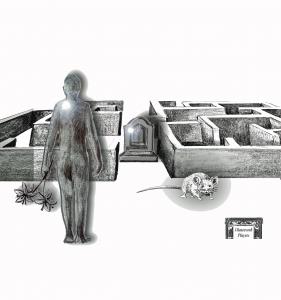
Having never read the award-winning book on which tonight's performance was based, I went into the show with a completely open mind!
The play told the story of Charlie Gordon, a man with learning difficulties who, with the support of his teacher, Miss Kinnian participates in an experiment which promises to increase his intelligence.
The only previous success with the scientific experiment was on a mouse, Algernon, whose increased intellect was indicated by his ability to find the cheese in a maze in the laboratory.
Charlie's operation appears to be a success, and through his daily progress reports, we see that Charlie's intelligence seems to have increased. Yet other parts of Charlie's life like his bakery job and his relationships with others begin to fall apart. Charlie starts to question his trust of others and his general happiness.
Algernon's condition begins to decline, provoking increasing concern for Charlie's well-being.
I would recommend Flower's for Algernon performed by five talented actors from Chatsworth players. The performance will next be on at Underground at the Arts Centre Studio on the 17th & 19th July, 9pm to 9:50pm.
Alice Featherstone
FOR I HAVE SINNED - Qweerdog Theatre Company
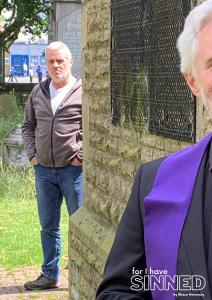
In the world of Fringe theatre, there is a strong vein of a certain sort of well constructed, powerful one-act play – two-handers in which a disparate pair are brought together, where conflict ensues, revelations ensue and power shifts. And it is in this particular genre that For I Have Sinned sits.
Suitably performed below the stained-glass windows of the United Reformed Church, For I Have Sinned brings together The Man (Marlon Solomon) and The Priest (Shaun Hennessy). The Man is haunted by an event 40 years before and threatening suicide. The Priest, reluctantly at first, is drawn into listening to the man’s story, as gradually the audience learn of the link between them.
Both actors bring authenticity to their roles. Solomon is intense and restless, depicting an anger simmering for 40 years. Hennessy – last year’s Fringe Award-winner for the role of the Man – conveys the complacence and arrogance of someone who is a pillar of his community and, for all his talk of service, appears to have little time for those truly in need.
While the plot does leave some unanswered questions, and I would have perhaps have liked to have seen a bit more of an exploration of faith and sexuality, there is no doubt that this play – simply staged with power and sincerity – holds the audience in its grip from start to finish. Like Edward Albee’s play The Zoo Story (possibly the originator of the genre) it is a play that revolves around shifting power dynamics between the two men, and this lean, slick production delivers those expertly.
Robbie Carnegie
THE FORGOTTEN - Dare to Know Theatre

An exposition of the 3 card trick is an unlikely start to a show about dementia, but it recurs throughout the show as a secure place for the character, George, to retreat.
The narrative development is aided by voices-off from George’s wife Allison, his sons, the care home staff, and even the police. The confusion of George (engrossingly played by Jeff Longmore) was effectively emphasised by light and sounds effects.
We all know or have known someone with dementia. We can’t know how it feels to be a sufferer and The Forgotten gives one version of this. As our population ages dementia is encountered more and more often so it is not surprising that this sad condition features frequently in contemporary writing. There are many articles and documentaries about dementia in newspapers and TV. Jake Talbot (the writer) makes a pointed and emotional contribution to our understanding of the suffering and confusion.
This offering by ‘Dare to Know Theatre Group’ brings focus to the gradual deterioration of a dementia victim; suffering not just from the disease but also (possible) neglect and abuse by care home staff. Whether this abuse is real or imagined is left to the audience.
Amusing an audience or keeping their attention is tricky but sharing a deep feeling takes a special talent. There is a lot of fun and frivolity at this years Fringe, it’s good to take in a serious and meaningful drama.
Further performances 7th and 8th July.
Brian Kirman
THE FORMIDABLE LIZZIE BOONE - Selina Helliwell Productions
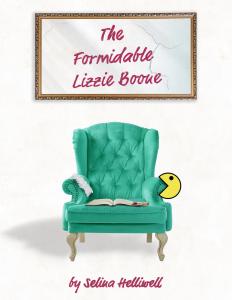
Tonight's performance of 'The Formidable Lizzie Boone' took place in the wonderful Rotunda tent on a drizzly Thursday evening approaching the end of Buxton Festival Fringe 2022.
The set of the show was very simple: a single foldable chair centre stage and Lizzie Boone herself.
The performance was set in her therapist's office, as Lizzie retold her very personal story and came to terms with her experiences, sharing how she overcame her traumas. Through her cat, Lionel, love of vodka and lemonade and her chats with her best friend, Debz (with a z!), the audience got an intimate insight into her life!
The show was very well-rehearsed and Selina Helliwell, who played Lizzie, had fantastic stage presence and engagement with the audience. The sound-effects were perfectly timed and worked so well with the drama of the show!
If you enjoy comedy with a positive message on self-love and believing in your ability to overcome the problems life may throw your way, you will love Lizzie Boone. The performance is on again at the Rotunda on the 23rd July at 7:30pm to 8:35pm!
Alice Featherstone
FOTHERINGHAY: AN AUDIENCE WITH MARY QUEEN OF SCOTS - Jane Collier
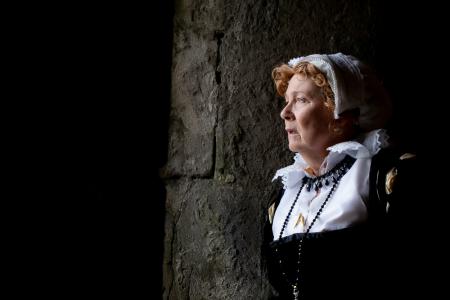
Performed over the course of ninety minutes, this show is perfect for both history buffs and those who are less familar with the life of Mary Queen of Scots. The audience join Mary (the wonderful Jane Collier) on the eve of her execution. Dressed in authentic period costume, Jane takes on the role of Mary and leads the audience through Mary's life from early infancy to this, the eve of her execution.
What is immediately apparent is that Jane has done her research. Over the course of 6 years Jane has read around her subject, spoken to well known authors who have documented Mary's life and visited all the places that Mary was held in captivity. Her memory is formidable.
This is not a dry rendering of the information though - Jane brings Mary's story to life with empathy and warmth. The gems and insights she shares give voice to Mary's hopes and aspirations. She also talks about the locations and the key players who surrounded Mary at the time and really prompts the audience to imagine what life must have been like in the 16th Century.
This was a great performance. Jane is supported by Jo who plays Mary's Lady in Waiting. Her quiet presence in the background, together with the quality of her costume adds to the whole experience. At the end of the performance Jane offered to answer any questions the audience had.
I came away feeling inspired and thoughtful. If you have any interest in history I would really recommend this show.
April Irwin
FREDDIE HAYES: POTATOHEAD - Freddie Hayes
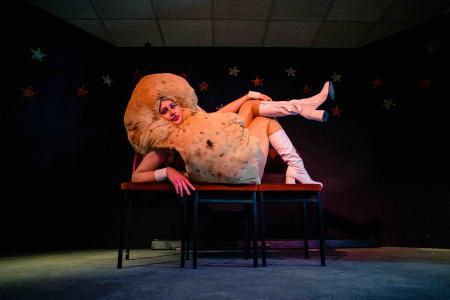
Potatoes were first introduced to England in the late sixteenth century at the same time as Christopher Marlowe wrote Doctor Faustus. Coincidence? Freddie Hayes doubts it. Potatohead is the story of Charlotte, a performing potato down on her luck who sells her soul to the devil in return for fame, fortune and appearing on TV.
There are sackloads of terrible potato puns and jokes peppering the show, there are silly songs and video montages, and little asides where Hayes takes some time out to explain that this is where three years at puppet school has got her. It is puppetry that is at the heart of the performance however, from Morris Piper, the devil’s emissary, to chips on her shoulder, Hayes is inventive and off the wall.
The highlight for me is the nightclub in a suitcase where Hayes small scale puppetry is augmented by video projections on the big screen. A bit like being in the back of the field at Glastonbury, you can still see what’s going on.
Who is the devil? Well, you may be surprised, but don’t say it hasn’t been staring you in the face all along. Can Charlotte’s soul be saved? You’ll have to go to find out. It’s a marvellously silly show and this potato is still a little raw, but Freddie Hayes is a likeable performer and gets the audience on her side. Enjoy, but go easy on the Smash.
Stephen Walker
HANNAH'S LEFT HOOK - Above The Title
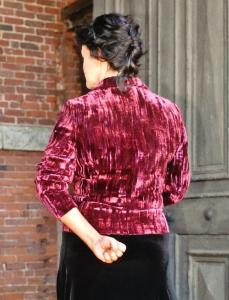
Hannah’s Left Hook is adapted by David Muncaster from Brian McKeown’s 2014 novel, which is in turn based on the true story of a washerwoman from Birkenhead who develops a fearsome left hook from all her scrubbing. Set during the First World War, Hannah uses her powerful punch against oppressors and wrong-doers.
Hannah first discovers her power when she clobbers her feckless husband after he has knocked down her blind mother, but when he goes missing in the war, and there’s a doubt over her widow’s pension, the feisty Hannah gets herself a job in the shipyard as the first woman worker there - though she’s not paid as much as the men. Her popularity grows as she lays out a manager who’s been exploiting the women in the office but finds Hannah a step too far. She blazes a trail for other women to follow her into the shipyards, becoming their figurehead and having a ferry named after her.
Hannah is played by her own great grand-daughter, Joanne Sutton, who has bags of personality and brings real energy to the role. The other parts are played by a cast of seven more actors covering multiple parts. The use of simple costume props to distinguish the different characters, whether butcher, priest or policeman, is effective, but with all eight actors present on stage at any one time the production can be a bit static.
It is a great story, and though, like many adaptations, the script often puts too much exposition in the character’s speech, it was well worth finding out about Hannah the Hammer and that famous left hook.
Stephen Walker
HOW TO FALL IN LOVE - Oak Tree Theatre Collective

A well-crafted and tightly written piece from director and writer, Hannah Garner and writer Hannah Snow, who also had a lead part (Emily) in this play. It was a clever construction balancing light-hearted and boisterous hangouts of a group of young women friends with emotional dialogues dealing with a range of issues affecting today’s women.
The seriousness of the topics underlying the dialogue pieces cannot be underplayed – and they weren’t! They were handled sensitively and realistically – as with the first one between Anna (Sally Thompson) and Lottie (Freya Evans). It took a philosophical look at the implications of having children. Another between Alex (Tanya Lebedeva) and Emily (Hannah Snow) explored the purposes and value of poetry.
The group scenes were rumbustious and pensive in equal measure – Nina Simone James as ‘AJ’ showed her comic talent ability in these sets and Sophie (Sophie Lorraine) showed her consistent ability to act credibly and naturally. The dialogue between Sophie and Emily was a ‘stand-out’ – a highly emotional and moving scene of frustrated emotions between friends and an excellent, memorable piece of acting. The dialogues progressively darkened; the final one between Emily and AJ dealt with how women can too often be pressured into trivialising terrible experiences - not least with issues surrounding sexual assault. Well handled by the two actors.
The play was neatly and most appropriately wrapped up by AJ, “Will we ever live in a world where marginalised people feel safe?” Heartfelt acting, meaningful writing, skilful direction, good audience reaction – and a lovely venue with great ambience (High Peak Bookstore and Cafe) - what more could you want on a summer evening!
Jim Marriott
IT'S NOT ROCKET SCIENCE - Letter for Letter Theatre
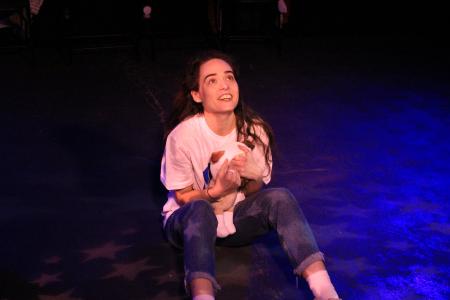
Built around the verbatim experiences of women in the aerospace industry, It’s Not Rocket Science is a well-research, thoughtful and very enjoyable depiction of the obstacles put in the path of a woman in a traditionally male pursuit.
As a young girl, Eve has a precocious interest in space travel, an interest that her parents foster, encouraging her aspirations of one day becoming an aerospace engineer. However, as begins to follow her dream she finds the world is not as encouraging as her parents, something that she has to face up to with quiet determination, forging her own path.
Alice Connolly plays Eve with a likeable directness, portraying a woman who simply can’t understand why her gender should hold her back. She isn’t strident or argumentative – she just knows that she’s right in the knowledge that being the best person for the job should qualify her. We see her facing day-to-day, low-level sexism throughout her career as she is variously encounters patronizing scientists, misogynistic students and women colleagues who advise her to ‘play the game’, these characters well conveyed by Helen Knudsen and Stef White.
It’s Not Rocket Science holds a deep-down hope that things will improve, that the gender balance in the industry is slowly shifting to something resembling equality, even if it has a way to go. The audience leaves, wishing Eve – and all the women who come after her – the opportunity to follow their dreams.
Robbie Carnegie
JEKYLL & HYDE: A ONE-WOMAN SHOW - Sweet Productions

Sweet Productions’ one-woman version of Jekyll & Hyde was one of the high points of the 2021 Fringe and it returns in 2022 with none of its power diminished.
Heather-Rose Andrews plays the buttoned-up Jekyll, observing with scientific detachment the actions of her alter-ego, the gloriously unabashed Hyde. Her Jekyll has the arrogance of the Victorian scientist, or even the colonial explorer, believing that Hyde is a child-like savage who can be educated into civilization. Meanwhile Hyde’s intellect quickly outsteps that of her creator, and unencumbered by the shame that surrounds her, Hyde undertakes a voyage of sensual discovery, satiating an appetite for sex and violence that Jekyll would profess to balk at.
Andrews inhabits both characters in a performance of vocal and physical precision. To watch her transformation from Jekyll to Hyde is to witness a body developing new muscles, contorting and stretching into someone who stands and moves entirely differently. It’s a painful metamorphosis but riveting to watch.
Ultimately the boundary between Jekyll and Hyde becomes blurred, Hyde owning her actions, while Jekyll tries to cover them up and pay off her victims. Writer-director JD Henshaw’s production remains a fascinating piece of theatre, and Heather-Rose Andrews’ directness and focus, drawing the audience into her world, is a treat.
Robbie Carnegie
KAFKAESQUE - Something Wicked Theatre Company
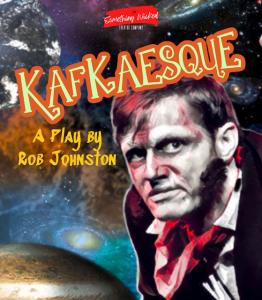
Franz Kafka's short stories are less well known than his longer works (The Trial, The Castle), and in the hands of Rob Johnston who adapted and directs these three tales are a rich source of material. These short pieces are given wonderful performances by Catherine Pugh and Adam Uray, thoughtful, persuasive and bouncing very well off each other. The novels have been turned into a fluid fluent script.
Kafka can be seen to be a difficult writer, a confusing writer, and one whose longer works are full of frustration, rich in allegory. These are much more gentle and accessible.
To say that they are 'dark' tales, as the company's publicity does, is just a little to misrepresent them, and they are much more attractive than that might suggest. We have The Hunger Artist, a performer in search of an agent to get him work; the Ape who does (or doesn't ?) want to transform himself fully into a human; and two characters who have their life's dream and ambitions always at their fingertips, constantly eluding them.
Allegory, to be sure, and the possible interpretations are many, and there's a good dose of humour as well. The three short pieces give us a view of the elusive spirit of being human, of relating to other people, with lively and appealing performances from both actors.
Michael Quine
THE LION, THE WITCH & THE WARDROBE BY GLYN ROBBINS - REC Youth Theatre Junior Company

It was fantastic to see the ever-popular Buxton Based REC Theatre Company back at the Fringe with their junior group. St Thomas Moore’s School was the venue for Glynn Robbin’s adaptation of The Lion, the Witch and the Wardrobe.
The large cast, ably directed by Clare O’Neill, acted against a simple set that suggested place. The cast will play different roles on different evenings, and this is a brilliant way to ensure the big parts are shared out.
In my cast, Milly Grubb as Lucy, performed with clarity and confidence and Will Clay was perfectly irritating as Edmund. Wilf Hornsey-Saunders brought the stage to life in his all too brief appearance as Father Christmas. There are far too many in this cast to name check everyone. However, everyone should be proud of their part in this team.
Aslan the lion needed to command the stage and the puppet, created in association with Babbling Vagabonds, was wonderful.
The fight scenes were brilliant, everyone involved acted with superb control to ensure they looked genuinely threatening.
The junior company perform with assurance and a great group spirit. At times the volume of speech could have been louder, but this was probably just opening night nerves. I wish I could see all the cast permutations; it would be a fascinating comparison.
Good luck with the rest of the run!
Jayne Marling
LITTLE BOXES - alphamum productions
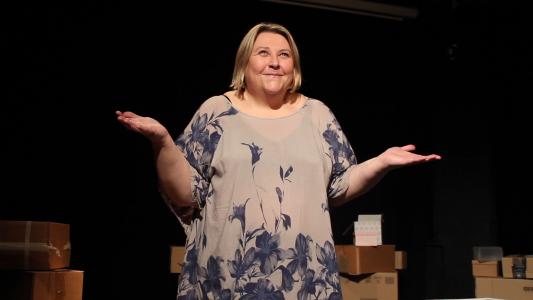
Enthusiastically received by a good-size audience, this show is witty, sharp, alert, human and humane and often very funny.
Joann Condon is a (she admits it, even revels in it) a fat woman actor, and she is an object lesson in working with the audience - self-confident, relaxed (so far as we can tell), and with a fine story to tell. Her story, in fact, but it widens out as the show continues.
Her starting point is that we are all identified, pigeon-holed, into little boxes, by family, friends, associates. 'Oh, she's the type who ...'. As with, say, children in a family - the gymnastic one, the bright one, the sporty one, the musical one, the fat one - with inept labels which tend to stick through life.
We hear her story: it could be (no: it is) the story of many people, and her message is 'don't let yourself be boxed in to other people's labels for you'. To be sure, she is an actor known particularly for her work in Little Britain (no - I didn't) and she tells with great humour and some wonderful anecdotes how she grew up to work in theatre and television.
But it's by no means simply a show about a respected performer: the tales she tells about the boxes a) she was categorised into and b) into which she sort-of packed away her history could apply to so many people. One lovely tale is about when she first went to a parents evening: wrapped up in constantly explaining to people that her name is Joann (no E, for a start, and yes, there are two Ns) and having thus established her own identity, she suddenly finds at school that she has no identity - she's nothing but 'Stephen's mum' to all comers.
So many wise observations, lots of good humour, a wealth of attitudes for us to identify with, and a fine stage persona.
Michael Quine
THE LITTLE PRINCE - Three's Company & Underground

Antoine de Saint-Exupéry’s 1943 novella The Little Prince is a perennial favourite, a delicate meditation on life and how it is differently perceived by adults and children. Tom Crawshaw’s new adaptation captures the wistful tone of the original, while Alice Kornitzer’s unfussy direction brings to mind the simplicity of the illustrations in the original book.
A Pilot (Ramzi DeHani) is stranded in the desert in North Africa. As he tries to repair his plane, his is met by The Little Prince (Ashlea Kaye). The Prince claims to have travelled from the stars, visiting various planets along the way, and meeting colourful characters on the worlds he has visited. The Prince enlists the Pilot to help bring these characters to life.
Both performances are finely nuanced. DeHani’s Pilot has a friendly approachability which draws the audience into the story, bringing the audience with him as his exasperation at some of the eccentricities of the Prince’s story gives way to his recognition that he can learn much from the Prince’s connection to the intangible. Kaye’s Prince is extremely well drawn – there is a deep understanding of the directness of a young child, the imperiousness of a child wanting an adult to join in their games, the unutterable sadness of a child whose dreams are shattered by an adult. These all exist in Kaye’s portrayal while never tipping it over into caricature.
While the audience at this performance was predominantly adult (perhaps suggesting that the book is now less well known to a younger generation), there is much to enjoy here for all ages. The design of this play is clever (I particularly enjoyed how a flying jacket and a glove became the character of the Fox), and Crawshaw’s script gives much for children and adults to enjoy.
Robbie Carnegie
MAKE-UP - NoLogoProductions
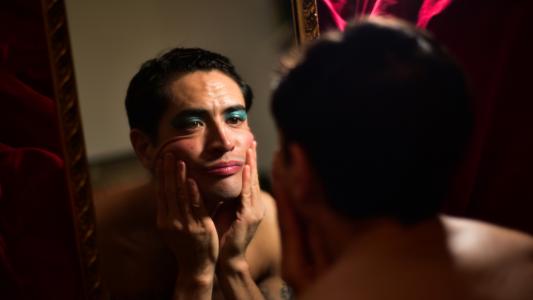
On strides Lady Christina, a heavily-tattooed, 'no holds barred' and 'don't give me that lip' drag Queen. In an explosion of foundation and cabaret-inspired anthems, she slowly disintegrates into an illusion.
Successful as a rampant stag onstage, she becomes Chris, the founder and Father of the glamourous gobster, an actor twice removed.
Resonant and remorseful in performance, we get to learn just exactly who pulls the strings. Sympathetic writing and crystal-clear diction pull heart strings tenderly one minute, before tearing asunder.
Who lies beneath the painted face? Identity is more than skin deep, it permeates the soul. And, where better to hide than beneath a flamboyant and impenetrable exterior?
Throughout the exposure, layer upon layer is peeled back, revealing the rawest roots. Christina is part-creation, part-chrysalis.
As the Lady herself would put it: Diamonds are only dirty carbon put under the greatest pressure. Fear, embarrassment and shame exert some of the greatest pressures known to man.
The show runs twice more in Manchester before heading off to Edinburgh. Come and see it, find out who lies behind the mirror!
David Carlisle
MISS NOBODIES - Ruth E Cockburn
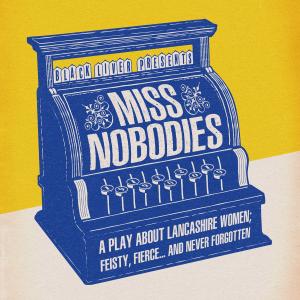
Miss Nobodies presents the untold stories of a selection of women based at a corner shop in Lancashire. The play explores 100 years of history to which these women's stories are central. Set against the backdrop of a fundraiser event for the High Street, the performance is hosted by Colleen (Ruth E Cockburn), a local shopkeeper, and Frank (Keith Carter), her husband.
The play uses comedy within the stories as a way of light-heartedly sharing the importance of the over-arching messages within each period from pre-WW1 to the present day. There is also poetry by Ethel Carnie Holdsworth, the UK’s first published working-class female novelist, which is used both to add to each story's important message and to provide a break between ‘fundraising’ performances each nicely punctuated with a shop door ringing.
Key to the play was this focus on the women, with their husbands only included as behind-the-scenes voices adding to their stories. I found this a clever twist from convention and a nice subversion of the title, Miss Nobodies.
Ruth Cockburn’s ability to distinguish the different characters each time was very impressive; every character from Colleen to Julie was entirely different which allowed the audience to engage thoroughly with the story.
One aspect I enjoyed was the addition of song into the play as a way of furthering characters’ stories; Keith Carter in particular had a way of amusingly mocking celebrity musicians from certain time periods whilst also still sharing important plot points through the songs.
Ruth noted at the end that without conversations with shopkeepers during the pandemic the show wouldn’t have been possible so I would like to thank those people for giving Ruth the idea for Miss Nobodies.
This is a show that embodies what it is to be a northern shopkeeper and shares the important stories of women sidelined by history. Ruth and Kevin (Black Liver) successfully turn these Miss Nobodies into Miss Somebodies through sharing their stories. This show is one that is very much worth a watch.
Miss Nobodies is on again Underground Venues at the Old Clubhouse on Wednesday 13th at 4pm. Black Liver has another show called Support Your Local Library! A Gothic Pub Rock Opera at Underground Venues on Tuesday 12th at 5:30pm and Sunday 17th at 8:30pm.
Anna Walker
NYCTOPHILIA - Haywire Theatre
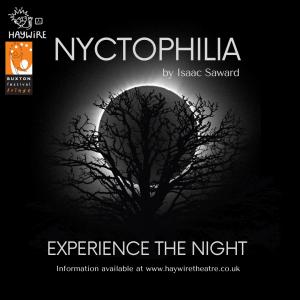
Nyctophilia means a preference for the night or darkness, and Haywire announce that while like many others this play grasps after love, mystery and magic, it will be performed in darkness with our ears as our only guide.
Panicking slightly about seeing a play in the dark just after lunch I had a strong coffee before setting out, but there is no danger of dozing off in this confident performance. As we enter, Catrin Edwards is playing ukelele and her engaging introduction puts us at our ease before the light fades.
The scenes in the play scripted by Isaac Saward shift backwards in time and encompass the transgressions and transformations that happen during the darkness. Two girls searching for a lost mobile phone tentatively hint at a deeper connection, a woman saying farewell to a lover on the eve of war is more brutally honest than she intends, while a wise woman in the time of witch trials helps a couple also on the wrong side of social judgement. All this is against the backdrop of mythic realms, sacrifice and the deeper connections made possible by darkness before the rebirth of a new day.
Though there are warnings about the darkness, and explanations of how to escape if you feel uncomfortable, in reality there is enough light bleed from the tech desk, and from occasional use of mobile phones and candles on stage to mean that it is not pitch black. I’m not sure if this is intended, but it does focus much of our attention on the figures on stage and the cast of Edwards, Lisa Jayne and Cameron Lythgoe are admirably fully committed even though we can’t make them out clearly at all.
Lucy Haslingden’s sound design is dramatic and a big part of the atmosphere, but occasionally it is too loud, particularly during scene transitions when it can be hard to pick up the opening words of a new scene, hindering our ability to make the intended connections. Diction does have to be spot on because the audience can’t see lips to help fill in for anything unclear.
Haywire are a brave young theatre company who brought Buckets to High Peak Bookstore last year and led by directors Olivia Clarke and Lisa Jayne have created an intriguing new play well worth catching.
Stephen Walker
THE RATS IN THE WALLS - Chris Neville-Smith with Durham Dramatic Society

This tale from one of the original masters of horror, HP Lovecraft, is an unsettling story of one man’s obsession about the rats he hears in the walls and our creeping understanding of the truth.
Charles Delapore opens the show muttering in the constraints of a straitjacket as he’s introduced to a visitor from outside his prison. He tells of returning to Exham Priory after discovering that he comes from an ancient family, the De La Poers, hated by all of the locals, their memory haunted by weird and twisted tales, of peasants who disappeared, an ancestor who killed all the rest of the family centuries ago, and a plague of rats bursting out of the abandoned priory.
Chris Neville-Smith is a perceptive writer on Fringe Theatre at his popular blog, but is prepared to put his money where his mouth is and produce pieces himself. As in his previous foray to Buxton with Waiting for Gandalf, he has chosen a character that suits him, His Delapore is agitated and unsettled, arrogant yet teetering on the brink of insanity, never quite regaining his poise as he delves into his past and that of the priory.
The show retains a constant sense of unease as it moves through time shifts and dream sequences, but the lighting and sound design makes each of these distinctive, especially the particularly eerie dreams that gradually play out in reality. This play is a great example of how technology has changed what can be achieved on a Fringe stage with the ability to run complex light and sound cues. It allows interaction with other voices not on stage, some of which works particularly well when Delapore speaks over bad news he doesn’t want to acknowledge.
The original Lovecraft short story was set in the aftermath of World War One, here Neville-Smith’s own adaptation places it closer to our times after the Vietnam war. This allows him to bring more recent wars into range and focus even more tightly on man’s inhumanity to man, even within the most supposedly advanced societies.
The Rats in the Walls may evoke other wider themes but at its heart it is a classic horror story which Neville-Smith has done justice to with a clever adaptation that produces a spine-tingling hour of theatre. I just have to forget the sound of those rats…
Stephen Walker
REPORT: AN ENQUIRY INTO INQUIRIES - Institute of Managing Performance

Complex, full of ideas, this two-hander written and directed by the prolific Mark Reid is perfectly titled 'An enquiry into inquiries'.
At first sight it seems to be (just!) an intelligent (intellectual) exploration of where truth lies or lay in the context of a number of the world's big public enquiries, national and international. 9/11, Dallas, The Troubles and the Savile Enquiry, Grenfell, Syria and many others are explored, considering to what extent the evidence may have been faulty, how much depends on the physical or the moral point of view of those appearing as witnesses, and how much depends on the initial stance of those who are set up to make decisions.
It takes the form of two people discussing, as they sit - initially and maybe not too comfortably - on a small sofa, maybe not too sure whether they are facing each other or speaking to us. They disagree, as people do in discussion: as they read out quotations from various Inquiry reports each takes a stand on his view of where the truth lies, then they occasionally appeal to us, the audience, to get our take on what we are hearing: whose side are we on? We are reminded, too, about the implications for the innocent when a report gets it wrong, is unduly hesitant, or runs on and on over many many years, apparently unproductively.
In a way it could be simply an intelligent and very well informed pub discussion on complex themes, and Ben Rigby and Barney Cooper deal well with what could have been a torrent of words.
But as their debate continues, they become heated, angry with each other, stand away from the sofa and open out the physical space, and as the piece develops there's a more nuanced development: from recognising the fact that they are taking positions, they come to realise more about themselves and their character. There's a final twist in the tale which comes with the denouement.
Michael Quine
RUNNY HONEY BY PATRICIA DOWNEY - Spanner In The Works Theatre Company
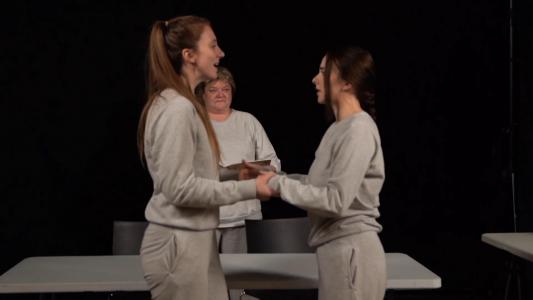
What a cracker of a show to start my Fringe Festival! Compact, lively, witty and beautifully performed.
We see three women as they come to know and understand each other in prison: one a recidivist who keeps offending on the outside ("a warm bed and three meals a day in here - why try to make a life outside?"), one whose unhappy childhood has led her to become a drug dealer, and one who for various reasons had to leave her new-born with her abusing male partner.
To be sure, this could have been hard-hitting social drama, but in the hands of writer/director Patricia Downey it becomes a warm affectionate piece, celebrating the way that the three different women come to appreciate and help each other, letting go then tensing up again. Some fascinating images along the way ... the show isn't a comedy nor light-hearted, but it has a commendably light touch: this reviewer particularly appreciated the idea of living life backwards - being born old and progressing over the years towards death which happens with a warm bath followed by orgasm: that raised a warm chuckle across the audience.
I'd love to give the three performers individual and specific comment and praise: but it's such an exemplary team effort from Claire Cogan, Louise Parker and Debbie Hill that it would be unfair to try to do that.
Michael Quine
STAR WART! A NEW HIP! - ReZolution Theatre Company (RECYT)
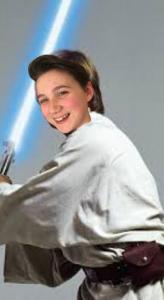
We are welcomed to St Bidulph’s Church Hall where the vicar (Phil Coggins) is playing host to the Biddulph Amateur Dramatic (BAD) actors and their production of Star Wars. To get around copyright they have to keep it short, especially as the Zumba class is chomping at the bit to use the room.
So the four-person group sets about their truncated sci-fi epic in a very silly show that’s full of invention and fun. The team from Rezolution Theatre Company are to be congratulated for devising a great series of set-pieces. Memorable sight gags include a hilarious slapstick scene of Luke Skywalker’s breakfast, with mops standing in for Uncle Owen and Aunt Beru and Darth Vader walking around wearing a spaceship and then unable to get through a door. There’s also witty songs, such as a long piece of exposition rendered in the style of ‘Alexander Hamilton’.
Inevitably not every joke hits its target and the ending could perhaps be tighter, but this show is a chaotic delight that has an energy and verve that carries it over any sticky moments.
Robbie Carnegie
A SUBSTITUTE FOR LIFE - Hint of Lime Productions
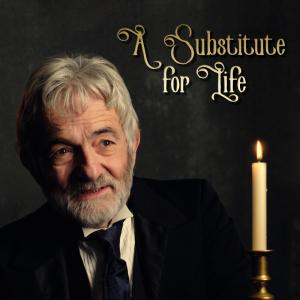
Upon entering the Rotunda tent tonight, we were greeted by the character of Francis Kenworthy sat centre stage behind a large desk covered in books and two candle sticks on either side.
The simplicity was dramatic with the flickering candles and Francis reading solemnly. Francis found solace and comfort in reading, using books as a distraction from the distressing experiences he faced during his Victorian childhood. He expressed his passion for language, and especially the work of Wilkie Collins. Francis recounts his life with such engaging and captivating story telling, embedding impressions of different characters, notably his father.
But when tragedy strikes in his life, he can no longer use literature as an escape from his problems and Francis feels forced to take drastic action of the situation.
I liked the fact that each member of the audience was handed a piece of paper giving us an insight into the writer, director and the talented Tim Hardy, the actor behind the protagonist.
I would highly recommend this brilliantly well rehearsed and absorbing play, performed again on the 24th July, the final day of the Buxton Festival Fringe 2022 in the Rotunda tent at 4:30pm to 5:30pm.
Alice Featherstone
SUPPORT YOUR LOCAL LIBRARY! A GOTHIC PUB ROCK OPERA - Black Liver
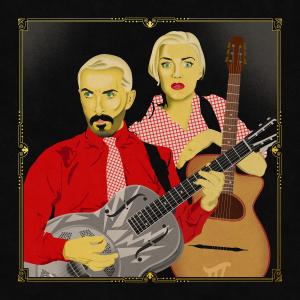
With their electric guitars and matching leopard print, Ruth E Cockburn and Keith Carter - AKA Black Liver (Ruth's from Blackpool and Keith's from Liverpool), warmly welcomed us to their brilliantly creative and original show this evening!
Despite the heat, the dynamic duo entertained us with their confident and relaxed stage presence plus impromptu interactions with the audience.
The self-proclaimed "rock 'n' roll observists" set the scene of the West End Rock Opera they had written featuring 10 fantastically imaginative songs, set in the town of Little Hope. The pair played a wide variety of characters in their show whilst putting on different accents. Ruth cleverly integrated interesting library facts while Keith spoke about the Black Bull pub in Wigan, sneaking in his obviously well-rehearsed musical impressions!
With some well-known celebrity impersonations making appearances as characters in the town of Little Hope and the tale to save the library, the show had a brilliant message that the knowledge we gain through reading books is powerful. They encouraged us by saying that we shouldn't be afraid of looking like "a prat" and that reading matters! I hope the rest of the audience left the show feeling the same as I did; that we don't have to take life so seriously and should recognise the importance of just having a laugh!
I would definitely recommend this musical satire on at Underground at The Old Clubhouse on the 12th July 5:30pm to 6:25pm and the 17th July 8:30pm to 9:25pm.
Alice Featherstone
SYLVIA VS THE FASCISTS - Breathe Out Theatre
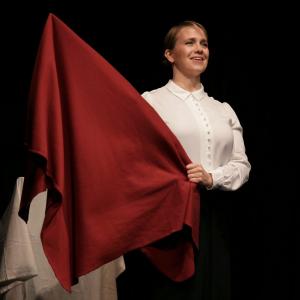
Breathe Out Theatre Company return to Buxton with Sylvia Vs the Fascists, a captivating one woman show. It recounts some of the fascinating life of Sylvia Pankhurst. As declared by Sylvia herself at the start, the show presents ‘history not as it was, but surely as it was meant to be.’
It touches on her time at the Royal College of Art and the gender inequality she experienced there. But then the main body of the story revolves around Sylvia’s battle against fascists in their various guises. This sounds like it could be a stuffy and worthy show…it isn’t!
Sylvia Pankhurst was an interesting person and this play brings part of her story to life in a retelling of past events with many humorous moments. It was genuinely funny in places which enhanced the feeling that Sylvia was a real woman and not simply a character in a play.
Emma Laidlaw plays Sylvia with great competence. She engages the audience through-out the one woman show with a warm and real performance. She played the character in an upright, well-spoken manner but seamlessly merged into her multi roles with glee and skill employing a variety of vocal and physical skills. She came across as a charismatic and self-assured character.
Rob Johnston the director introduced the evening by saying this was performance 15 and this production does play as a really polished piece of theatre. Rob also operated the many sound effects that came with the show. These served to enhance an already interesting performance. At the end I had to marvel at how skilfully one actor, on a small stage could bring so much life and calm charisma to a story.
A slick and interesting retelling of history.
Jayne Marling
TAKING FLIGHT FESTIVAL 2022 - Red Dragonfly Productions
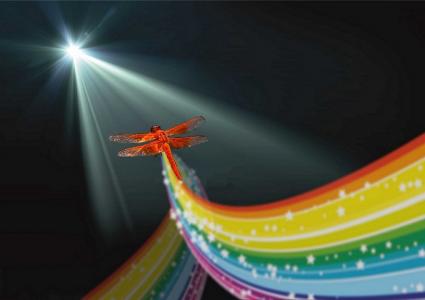
Red Dragonfly’s Taking Flight Festival presented a reading of the winner of its New Writing Competition, What’s Best for Jada by Alex Blanc.
Richard (James Jip) welcomes his ex-wife Maria (Michelle Yim) into his new home, back from two years in Singapore, and only a few visits home to their daughter Jada. He has made an effort with dinner but it is clear some hard conversations have to happen. He and his new partner Claire shower Jada with attention and treats, while Maria is more concerned about her education and physical health. The clash of styles can be traced back to their Chinese upbringing; rejected by Richard, Marie embraces it providing what she believes is important, money for Jada's education and care.
Their different attitudes to raising Jada are nicely drawn out as they begin to clash, and neither gets the upper hand, each one’s priorities in parenting play to their strengths but each is undermined by their own weaknesses, and their reliance on each other. Marie struggles to form a bond with Jada and needs Richard and Claire to do the day to day caring, but Richard is financially incontinent, spending money freely, while incapable of earning any, and needs Marie’s stability and financial backing.
The scene is set for finely drawn arguments, driven by their differing backgrounds and attitudes. Financial stability vs care and attention, physical vs mental health, present vs future happiness. Playwright Blanc’s skill is in keeping these arguments within the personal drama of people we care about, our allegiances shift as new revelations emerge, and Claire (Daisy Roe) arrives home, possibly the only one who really has Jada’s best interests at heart. Will anyone get their own way? And is what’s best for Jada really what is motivating them?
It may be a play-reading, with all three actors seated on-stage script in hand, but they absolutely commit to it and the audience is caught up in the unfolding drama. Alex Blanc is a deserved winner, What’s Best for Jada is a good play and it would be great to see it in a full production.
Stephen Walker
THE TRIALS OF GALILEO - Hint of Lime Productions
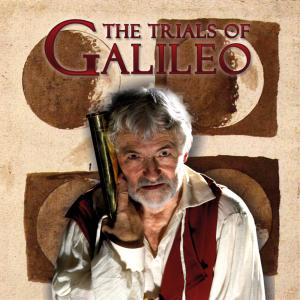
What a treat this was! This show is fascinating, intriguing, warm-hearted, informative on so many levels, and beautifully performed.
We have Galileo in discussion with himself, with the court trying him for heresy, with the Pope, even with us the (unseen but omni-present) audience. How could he, a good Catholic, have dared to prove that the Church was wrong in its belief - no, its absolute knowledge and certainly - that our Earth, our planet, is the centre of the universe around which everything else revolves? Should he repent? should he face the rack as the Church's way to make him admit his error?
The script, from Nic Young, is tight, elegant, and so very effective in conveying Galileo's internal struggles over time as well as the dialogues with his enemies: it also conveys in the easiest possible way the physics of Galileo's findings.
Tim Hardy gives us it all, persuasively and utterly believably moving through confidence, anger, warmth and reflection with a sharp wit, hanging on to his religious faith while at the same time undermining one of its key tenets.
It's not a new play, but for all that it's tempting to draw some parallels - the absolute certainty shown by Pope Urban VIII in 1633 with similar political attitudes being shown elsewhere in our time.
Hardy owns the stage through the show, just as he does in his other Fringe show this year, "A Substitute for Life", which this reviewer recommends just as highly.
Michael Quine
TWIST! - J45 Productions

After the first three performances of this were cancelled due to technical issues, we were finally able to experience the first night.
This is not a strict retelling of Oliver Twist by Charles Dickens. Instead it uses the main character to tell a story in the modern underworld of the Liverpool docks.
The play starts with a confident-looking girl entering the stage amid the noise of a fight and a scuffle off stage, then Dodge and Twist (Dodger and Oliver) first meet.
The two lead characters, Zoe Watts as Twist and Embrei as Dodger, both give outstanding, powerful performances. They then meet Fagin, played by the writer of the play, Franklyn Jacks, cue great interplay between the three characters to set the scene - a murky underworld of county lines drug dealing.
We then meet Sykes and Nancy, played by Bethany Murray and Ted Grant. The play over-ran by about 10 minutes mainly due to not very quick turnarounds between scenes. Maybe if this had been the fourth performance, it would have zipped along more quickly.
Still, there were very fine performances, especially by Dodger, who had a very strong stage presence, but also by Twist who showed the vulnerable side of a life in the underworld.
The show is definitely worth seeing with a strong cast putting characters we all know into a modern situation. It's in the coolest venue in town, The Green Man Gallery, so you don't have to worry about the heat too much. You can catch it at 630pm tonight (July 19th).
Robert Harrison
UNCOMMON GROUND - Hint of Lime Productions

This was the first public performance of Alison Skilbeck’s new play, Uncommon Ground, but you couldn’t tell that from her assured performance. A few props appeared from a cardboard box, and we were introduced in turn to different passers-by on an unnamed common, somewhere in London. Set during the pandemic, the characters reveal the impact of the life changes caused by repeated lockdowns. While lockdowns have shattered some dreams and plans, others have been inspired to try new avenues. Wait until you meet Fairy Draggle! As the play goes on the audience starts to see the connections between characters and their tales are cleverly interwoven.
Alison Skilbeck convincingly portrays characters ranging from seven year old Matthew, who matter of factly refers to himself as a parcel being passed between separated parents, and Tilly, who is at the other end of life. There are many moments of comedy which balance the more serious subjects. The most serious subject of all is discussed at the end, when the half-concealed narrator is finally revealed.
There is one more chance to see this on the final day of the Fringe, Sunday 24 July, at 1.15pm, in the Rotunda. Don’t miss it!
Georgina Blair
THE WAR OF THE WORLDS - Grist to the Mill Productions

HG Wells’ sci-fi masterpiece The War of the Worlds is a first-hand account, by an unnamed journalist, of the arrival of a Martian invasion. It depicts a Britain complacent in its Edwardian imperial pomp, brought down almost effortlessly by ‘minds immeasurably superior to our own’. As such it is as much a critique on colonialism as an adventure, as well as a treatise on evolution and what humankind might ultimately turn into as it gradually replaces human functions with machines.
In this one-man adaptation, Ross Ericson plays the unnanmed journalist who bears witness to the invasion. The scene shifts in time, moving between his breathless account of the arrival of the Martians, and his weary accounts of the latter days of mankind’s subjugation. Ericson is very easy with whom to spend an hour, and his recounting of this well-known story always retains an immediacy and truthfulness that makes an audience feel it’s hearing the story for the first time.
The adaptation is sure-footed and clear, and skillfully manages to avoid the long shadow cast by Jeff Wayne’s musical version, and Richard Burton’s mellifluous tones, molding the narrative into something fresh and diverting.
Robbie Carnegie
WOLF MOON - REC Youth Theatre

On a beautiful moorland, populated by lively hares, a group of children have noticed that the moon has disappeared from the sky. They meet a group of magical creatures, the Hobbs, who tell them that the moon has left, disappointed by the unkindness of humans, to each other and the planet. So, the children must learn the importance of team spirit to go on a quest to return the moon to the sky.
This is the set-up to Clare O’Neill’s delightful show, being performed by the younger age-group of the REC Theatre. It is a play which champions team spirit, and the show demonstrates that spirit on stage, the older children helping the younger ones, and the whole team creating a delightful experience for the appreciative audience.
Over the two performances of Wolf Moon, the cast alternated, making it hard to single out individuals, but a standout in the first performance was Faye Turtle as Anu, the queen of the earth spirits, who dominated all her scenes with humour and great stage presence.
These performances were dedicated to the memory of former Fringe vice-chair Viv Marriott, who championed youth theatre at the Fringe. Wolf Moon demonstrated exactly the qualities of teamwork and burgeoning talent that Viv loved so much, and is a testament to the inclusivity and inspiration of the REC.
Robbie Carnegie
ZAV - PJV Studio

Zav, or rather Xavier, is the last man in the castle, but that won't mean a thing if the castle is built on subsiding ground. A castle in the air is no better, but it is a good place to get a view, looking down on life's choices.
The leap from gritty heavy-metal loving Welsh road-worker to internationally celebrated darling of the photographic world is not as far as the leap from those castle walls.
Hear all about the rise of Zav in a twisty story, full of surprises and happenstance, wrapped up in northern wit and delivered with deadpan sincerity. Like a stretched rubber band, anxiety and relief take it in turns to flood throughout.
Sometimes, it is difficult to see the road ahead, even if your job is on the black-stuff called Tarmac! And 'The Golden Road' is not just one of Zav's finest images, it is a destination, his route to the boulevard of dreams.
On a journey to find yourself, you always take yourself with you, so don't be surprised where it leads and who you find waiting there!
David Carlisle
[BLANK] BY ALICE BIRCH - Shadow Syndicate

It’s been three years since Shadow Syndicate last graced the Buxton Fringe, and we’ve missed their presence over that time. Regulars in Buxton for many years, they have built up a strong reputation for hard-hitting contemporary drama for young people. The plays they perform clearly speak to the young actors, eliciting truthful, intense performances that are not always – especially for some of the adults in the audience – easy to watch. These are plays which tackle subjects many would fear to tackle, but which Shadow Syndicate embraces.
[Blank] by Alice Birch very much keeps this tradition alive. It tells the story of Jess, placed in the care system as an infant as her mother is in prison for an act of violence. Jess undergoes a life of bullying, peer pressure, date rape and drugs, a cyclical path that we soon realise, is a case of history repeating itself.
In the all-female cast, Jess is played by four actors – Natasha Morris, Anais Barre, Isabelle Atkinson and Anna Bayley. All four are called upon to deliver increasingly raw and vulnerable performances, and all succeeding in touching the audience through their increasingly desperate lives. Anais Barre is also chilling as Jess’s boyfriend, Trevor, while Eliana Russo impresses as Jess’s chief antagonist, Maddie. But the entire ensemble should be commended for the fearlessness of their performances.
This is a play pretty much without adult authority figures – the only exception being a complacent social worker who appears at the end. The play appears to be showing us young people who have been left to fend for themselves in a justice and care system that appears indifferent to their plight once they are in it, only coming in to pick up the pieces when almost inevitable disaster strikes.
After the enforced gap that Shadow Syndicate have been forced to take from Buxton, [Blank] establishes their presence once again with great strength of purpose. I look forward to seeing them again next year.
Robbie Carnegie



